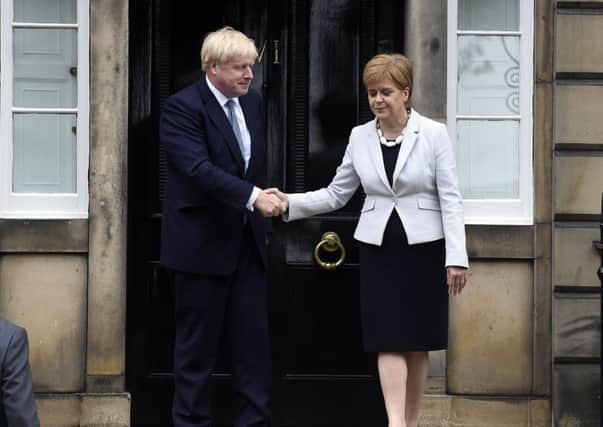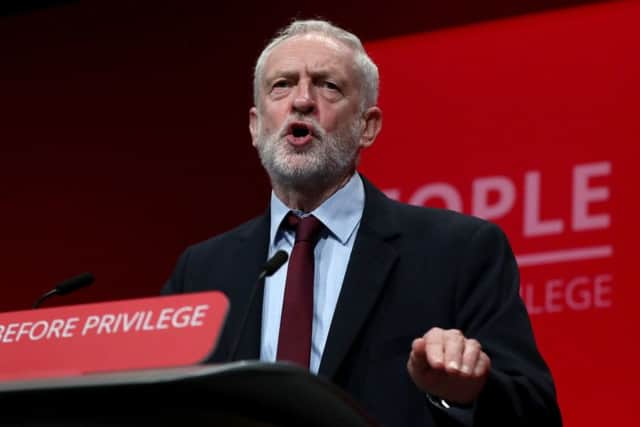Brexit: The smoking gun that shows the SNP secretly wants no-deal – Murdo Fraser


The slogan at last week’s Conservative Party conference, plastered all over the walls at Manchester was simple: “Get Brexit done.” In that, the conference was speaking for a large chunk of the British population.
It is striking how well the UK economy is doing despite the current situation with Brexit. GDP growth substantially outstrips Germany. Employment rates are at record highs, and unemployment is at a 45-year-low (although higher in Scotland than the rest of the UK). We could only imagine how much better the UK economy would be doing without the cloud of Brexit uncertainty, which undoubtedly has negatively impacted on forward planning and business investment.
Advertisement
Hide AdAdvertisement
Hide AdSo we know that we need to get Brexit sorted. Our economy needs certainty going forward, our farmers want to know they will still be able to sell their products into Europe, and our businesses and public services need to know that they will have access to the talent they require.


I voted Remain in the 2016 referendum, but I believe the Government has a duty to respect the outcome of that vote, and deliver on Brexit. It remains a source of great regret that on the three occasions when Theresa May’s Withdrawal Agreement – a deal which, whilst imperfect, would have delivered an orderly Brexit and taken us into a transition period – was presented to Parliament it was voted down. Labour, Liberal Democrat and SNP MPs combined with Tory rebels to stop us moving to the next stage and taking us out of the EU. Brexit uncertainty would be substantially at an end had they voted for the deal on the table.
We now have a new deal proposed by the Prime Minister, one which looks like it has substantial support in Parliament: from across the Conservative Party, from the DUP, from members of the ERG who previously were serial rebels, and from Labour MPs in Leave-voting seats. It is quite possible this proposed deal could achieve for Boris Johnson what Theresa May failed to do, and obtain a Parliamentary majority.
Of course, any deal has to be agreed with the EU27, and the indications so far are that they believe that it still falls short in a number of areas. The crucial question is whether the deal can be tweaked sufficiently to win EU agreement, whilst retaining enough support amongst MPs to get it through the UK Parliament.
Self-interest, not national interest
In contrast to the positive moves being taken by the Prime Minister, we have an opposition acting not in the national interest, but purely in their own political self-interest. They cannot even seem to agree between themselves as to the right way forward.
Proposals to put in Jeremy Corbyn as interim Prime Minister have fallen at the first hurdle, despite Nicola Sturgeon and the SNP indicating their support (in exchange, naturally, for a second independence referendum). This was too much even for the Liberal Democrats to stomach, with their Scotland spokesman Jamie Stone MP saying he would prefer a no-deal Brexit to the prospect of Corbyn as PM, although he later claimed he meant the opposite.
The Liberal Democrats would now disregard the 2016 referendum result altogether. Labour wants a second referendum, and despite previously having clamoured for a general election seem to have backed off any support for this happening early, no doubt with an eye on the dismal opinion poll ratings for their party and leader.
As for the SNP, their every utterance on Brexit is governed by one simple consideration: what might help increase support for independence. From the very day that the 2016 referendum result was announced, when within hours Nicola Sturgeon was on her feet in Bute House announcing new legislation for indyref2, the Nationalists have tried to weaponise Brexit to build support for Scexit.
Making no-deal more damaging
Advertisement
Hide AdAdvertisement
Hide AdWhilst the SNP might publicly protest against a no-deal Brexit, in reality that is what they are privately wishing for, believing that the turmoil that would be created would push support for separation above the 50 per cent mark.
So, at every opportunity, Michael Russell is out there undermining the UK’s negotiation position, and casting doubt on the deal now being proposed by the Prime Minister.
How else might we explain the SNP Government’s failure to pass on Brexit funding from Westminster to local authorities across Scotland? We learned at the weekend that of some £99 million handed over by the UK Government in Barnett consequentials, only £1.6 million has been delivered to councils. They have been told to submit individual business cases to the Scottish Government for their share of the cash, when in England it has been paid directly to local authorities.
One does not need to be the world’s greatest cynic to see this as an attempt to make a potential no-deal Brexit more damaging than it otherwise would be, by preventing public bodies here from properly preparing. This is an appalling way to treat the Scottish population, but no sacrifice is too great if the cause of separation is to be advanced.
If all the SNP MPs had voted for Theresa May’s Withdrawal Agreement the third time it was brought to Parliament, the threat of a no-deal Brexit would have been removed, and we would not now be in this situation. But the First Minister and her colleagues would rather play politics with the issue, looking for partisan advantage, than act in the broader national interest.
As for the Prime Minister, a way forward is very clear. Get a deal agreed with the EU27. Put this to Parliament, hoping to win support from members of the ERG, from the DUP, from the 21 rebel Conservatives, and from Labour MPs in the Leave-voting seats.
If this goes through Parliament, then we must have a General Election, allowing the country to decide who takes it forward. If Parliament votes down the proposed deal, an early General Election is even more essential, as we cannot allow this deadlock to continue any further.
The Prime Minister has shown his willingness to compromise, to try and reach agreement on a deal with the EU27, one which will have Parliamentary support. For that, he should be applauded. Now it needs the opposition parties to show some similar good grace.
The country is crying out for us to get Brexit sorted. The people will not forgive us if the opportunity is lost once again.
